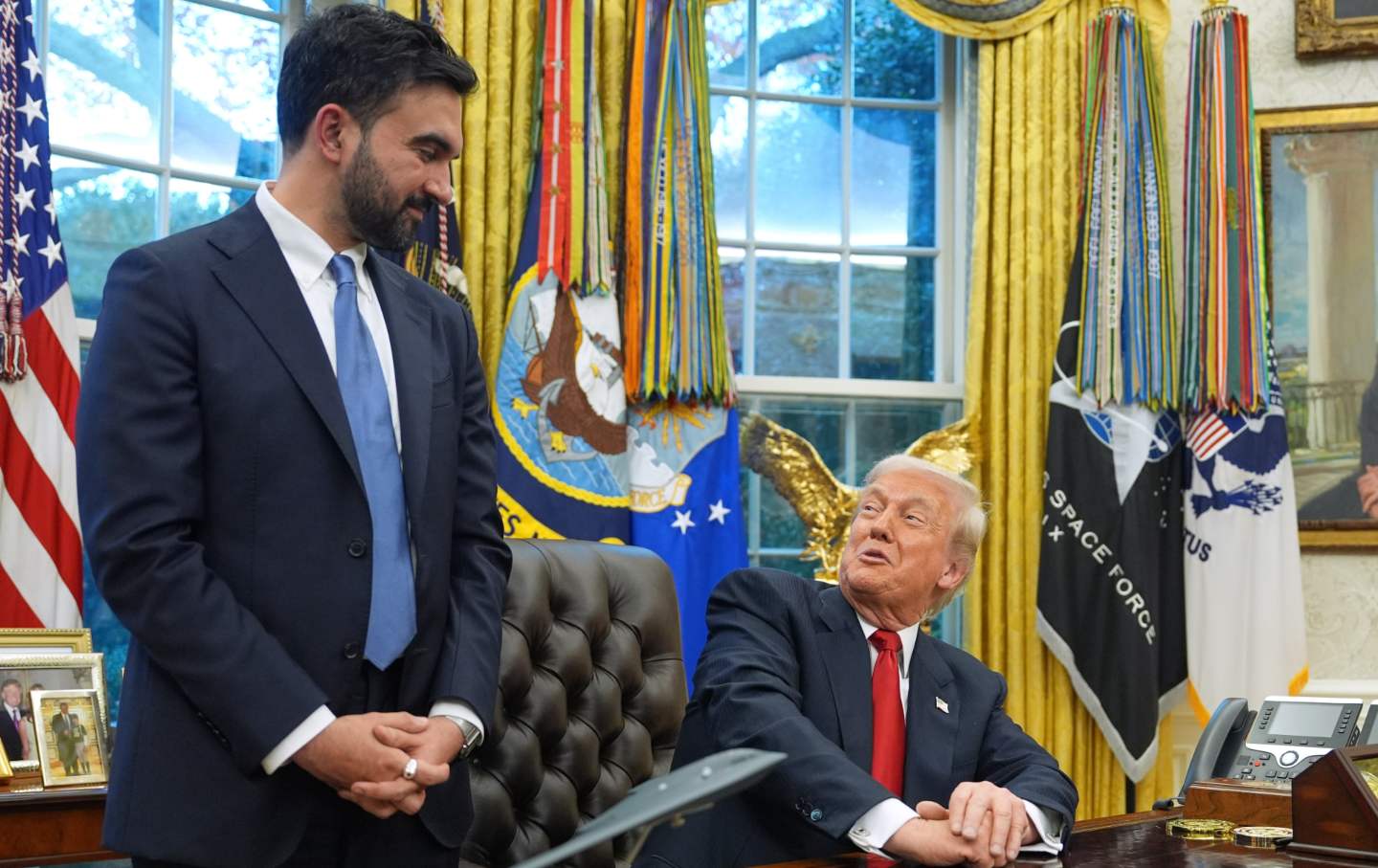The journalist’s rise and fall and rise again looks like a performance of tabloid drama. But really, it’s Beltway access reporting taken to its natural extreme.
Reporter Olivia Nuzzi arrives for the White House Correspondents’ Association dinner at the Washington Hilton in Washington, DC, April 29, 2023.
(Stefani Reynolds / Getty Images)
Future chronicles of the utter debasement of American political journalism will have to devote an entire chapter to the blowjob. The oral sex act was central to the 1998 Monica Lewinsky scandal, and figured prominently in President Bill Clinton’s deposition advancing the argument that it didn’t actually fall under the rubric of active “sexual relations.” An avalanche of forensic scrutiny in the press ensued. Then, in 2007, a notorious airport restroom contretemps involving Idaho GOP Senator Larry Craig got such blanket coverage that his flimsy alibi—that he employed a “wide stance” during bodily evacuation, and happened to brush his foot against a patron in an adjoining stall who turned out to be an undercover cop—soon became a synonym for “gay and closeted.”
Somehow, in hindsight, this salacious discourse comes off as positively quaint next to the revelations recounted by Beltway journalist Ryan Lizza in his serial Substack breakdown of the demise of his relationship with Olivia Nuzzi. In case you haven’t already heard, Nuzzi, the former DC politics scribe for New York magazine, had conducted an apparently digital-only affair with current (and currently married) Health and Human Services Secretary Robert F. Kennedy Jr. during his third-party presidential run, after Nuzzi had profiled the candidate for New York. The ensuing scandal plunged Nuzzi into a short bout of professional disrepute, prior to her full rehabilitation as West Coast editor at Vanity Fair, and the author of a leadenly composed memoir graced with the unbearably pompous title American Canto. In his follow-up Substack post, Lizza describes his discovery of Nuzzi’s dalliance with RFK Jr. when he came across a poem to Nuzzi by the Camelot heir. It is my unfortunate duty to present it in full here:
Yr open mouth awaiting my harvest. Drink from me Love. I mean to squeeze your cheeks to force open your mouth. I’ll hold your nose as you look up at me to encourage you to swallow. “Dont spill a drop”. I am a river You are my canyon. I mean to flow through you. I mean to subdue and tame you. My Love.
The challenges that this word-picture presents to reader comprehension make Bill Clinton seem a mere piker in plumbing linguistic ambiguity. A river is somehow generating a harvest, while acting in domineering fashion to “subdue and tame” a canyon—a process that takes roughly a million years. (Perhaps acts of fellatio stretching across millennia of geologic time is what our conspiracy-minded, vaccine-averse HHS secretary means by Making America Healthy Again?) Having only recently had breakfast, I can’t offer much comment on the imagined manipulation of the inamorata’s face, except to note that it is distinctly un-river and un-harvest-like.
Of course, one probably can’t expect a sustained unmixed metaphor from the pen of someone whose successful Harvard application essay consisted entirely of his name. One of the most chilling disclosures in Lizza’s scandal-drenched confessional Telos News post is that Nuzzi was in possession of not just this poem but “many others” that were “too explicit to print.”
Lizza insists that we know about these exceedingly graphic details to get a full sense of the mysteries of Nuzzi’s serial infatuations with much older and more powerful men—in addition to the RFK Jr. entanglement, she had earlier affairs with indefatigable cable monologuist Keith Olbermann and, according to Lizza, the former GOP governor of South Carolina, Mark Sanford. She was engaged to Lizza for much of this star-fucking. But as with so much in this sensational and sordid tale, there’s no discernible “there” there. This is all that Lizza offers by way of pained insight into his lost love: “Olivia develops addictive-like attachments to the men she loves, who are generally older and more powerful, and she pursues them until she conquers them. ‘I’m three for three,’ she said to me in a moment of levity after the affair with Mark.”
Nuzzi’s own book excerpt, devoted to her RFK Jr. obsession, is likewise filled with banal efforts to conjure meaning from the attachment, while offensively employing the backdrop of Ventura County’s 2024 Mountain Fire, leveraging the planet’s climate crisis for still more clumsy metaphor-mangling. “You cannot outrun your life on fire,” she writes bathetically—and, alas, she’s just getting, er, warmed up:
The earth here is hot. Inside the bonfire, what evidence can I burn? I think of all I turned to ash in hotel rooms. I think of how you cannot burn a cloud.
(Whereas I think, where are Nuzzi’s editors?)
I think of the classified documents at Mar-a-Lago, how there were so many, how the officials did not know what to do with them, and how fire seldom seemed to occur, though the White House and the president’s properties are studded with fireplaces. Too easy. I worry.
Indeed, what becomes clear across the dreary narrations of this dreary imbroglio isn’t so much that Nuzzi is addicted to age and power, or that Lizza is addicted to Nuzzi and “revealing the truth”; no, it’s that all parties are in thrall to the act of portentous narration itself. There’s Robert “A River Runs Through It” Kennedy Jr., frantically commemorating a sexual act that was evidently never consummated in gruesomely purple prose; there’s Lizza, who has for some reason adopted the similarly weak metaphor of an untamable patch of backyard bamboo to explain how deceit and betrayal ate away at his illusions of domestic peace. And there’s Nuzzi, whose penchant for self-narration and rapid-fire self-reinvention stands lethally athwart her grasp of the reality principle. After Lizza confronted her about her affair with Sanford, he apparently found still another damning document in the Nuzzi archive (the author’s habit of casually strewing the evidence of her unfaithfulness also seems to be of a piece with her manic tell-all drive; nothing, however intimate, appears to transpire in her life without an audience). Here’s Lizza’s synopsis:
Olivia had written a tabloid-style news story about how “sources in Washington, D.C. and Charleston have been buzzing recently about an unexpected romance: Mark Sanford and Olivia Nuzzi,” who was described as “one of the most famous political reporters in America,” a “blonde beauty” who “gained critical acclaim as a skilled profile writer, gaining access to the powerful and the mysterious and turning it into pure journalistic gold.”
Nuzzi tells her fiance that this was an exercise in plotting out the worst-case scenario of her exposure for sleeping with a source (she had published a fawning profile of Sanford prior to their more intimate acquaintance)—an explanation he rightly notes “didn’t make sense given the piece’s tone.” Yet again, however, Lizza settles for a plodding pop-psychology takeaway, noting only that “fantasizing about what it would be like when her secret relationship with a notorious politician finally became public would repeat itself during her affair with Bobby.”
The more damning, and likely more accurate, moral of this set piece is that this was, and remains, the business model of Olivia Nuzzi’s public career—together with the bloated and corrupt enterprise of Beltway journalism writ large. To appreciate this point, it’s crucial to focus not on the daytime-TV-grade anatomies of Nuzzi and Lizza’s relationship, nor on Nuzzi’s imagined verbal alchemy and blond pulchritude, nor on RFK Jr.’s heavy-breathing reveries. No, the skeleton key here is Nuzzi’s generic invocation of “access to the powerful”—the dynamic that governs what gets written about the most influential figures in our civic life, and how it continues to defile any intelligible notion of the public interest.
Nuzzi’s serial assignations with her profile subjects are more a difference in degree than in kind from the main run of our intellectually inert journalism-power complex. In gaining the closest possible proximity to figures such as Sanford and RFK Jr., Nuzzi was pushing the logic of conventional Beltway access reporting to its natural extreme. The notion that our most powerful leaders must be courted with sycophantic flattery is one of the most toxic articles of faith in the mainstream media; Nuzzi’s error was to not merely deploy it in the register of erotic life but also train it on marginal figures like the disgraced also-ran Sanford and the manifestly deranged RFK Jr., who was then little more than a late-night TV punch line. But she was genuinely faithful to the core precepts of access-driven political writing, which holds out to reporters the empty promise of early access to the inner workings of plutocratic thinking ahead of the competition.
That’s why the real sins of access journalism aren’t locked into the ids of the parties to this ugly social contract but are hiding in plain sight. The myth of Camelot that proved so beneficial to RFK Jr.’s Harvard prospects and subsequent career was an invention of Life magazine election scribe Theodore H. White (and closely edited by JFK’s widow) meant to distract public attention from the decidedly equivocal record JFK compiled in office. The press’s prostration before war criminal Henry Kissinger was a veritable cottage industry. Former New York Times DC bureau chief James Reston all but officially leased space in his regular column to Kissinger’s pet crusades and talking points; in one especially repellant episode, Reston intervened at Kissinger’s behest to spike a Pentagon reporter’s news report that bombing in North Vietnam was set to resume in December 1972. When Kissinger was again found to be lying and the bombing proceeded on schedule, the ever-obsequious Reston published a column citing Kissinger, wrongly, as a critic of the operation. (This was all fairly routine conduct at the Paper of Record; when former Times publisher Arthur Ochs Sulzberger excitedly telephoned his mother with the news that he’d just had lunch with President Reagan and Vice President George H.W. Bush, her wan reply was “What did they want?”)
In the Trump era, as a washed-up reality-TV star assumed ultimate power during the economic free fall of the media industry, all these baleful trends have gone into overdrive. Beltway scribes present witless accounts of Trump as an innately mesmerizing and enchanting character, while the president himself leans on his regulatory powers to create a maximally deferential media complex. It’s now common practice for Beltway reporters to sit on consequential news scoops to milk them in later book releases—when the relevant trespasses and abuses of power have often passed their sell-by date for effective public oversight. Amid these conditions of unchecked megalomania on high and abject moral cowardice in the sanctums of corporate journalism, it’s perhaps not surprising that the petty and squalid longings of Nuzzi, Lizza, and RFK Jr. should command such wide interest. Or that blowjobs, however clumsily imagined, should be the guiding metaphor here.
Popular
“swipe left below to view more authors”Swipe →
More from The Nation

“Operation Charlotte’s Web” may mobilize North Carolina’s working-class Latino members and allies to shift the political balance of power at the local, state, and national levels….

The incoming mayor has improbably charmed Donald Trump and given himself some political breathing room. But nobody should get too comfortable.










